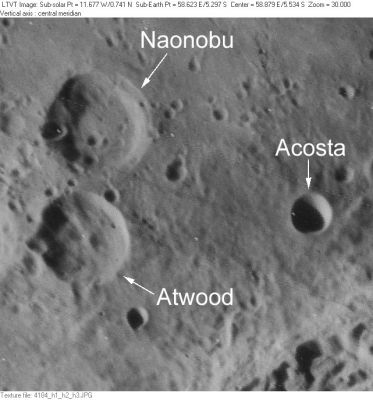Atwood
Contents
Atwood (aka Aller) - of the trio Atwood-Bilharz-Naonobu NW of Langrenus
(formerly Langrenus K)
|
Lat: 5.8°S, Long: 57.7°E, Diam: 29 km, Depth: 2.5 km, Rükl: 49 |
LO-IV-184H The other IAU-named features in this field are Acosta and Naonobu. The large crater whose rim protudes in the lower right is Langrenus.
Bilharz (the unseen third member of the trio Atwood-Bilharz-Naonobu) is off-screen at the frames's left margin.
Images
LPOD Photo Gallery Lunar Orbiter Images Apollo Images
Maps
(LAC zone 80A3) LAC map Geologic map LTO map
Description
Description: Wikipedia
Additional Information
Depth data from Kurt Fisher database
- Westfall, 2000: 2.5 km
- Viscardy, 1985: 2.2 km
Nomenclature
- Named for George Atwood (1746-1807), a British mathematician and physicist.
- The name Langrenus K was part of the original IAU nomenclature of Blagg and Müller (Catalog Entry 4689). The name is attributed to Neison. It was called Langrenus X by Schmidt.
- The Hallwag-moonmap (and other Moon maps of the fifties and sixties) show the name Aller. This name was proposed by Hugh Percy Wilkins and Patrick Moore (see their book The Moon), but the I.A.U. did not accept the name. Aller was a contemporary Spanish astronomer (Ramon Maria Aller Ulloa, 1878-1966).
- This name Atwood was provisionally introduced on LTO-80A3 (April 1974). It was approved in IAU Transactions XVIB (1976).
The trio of craters Atwood, Bilharz, and Naonobu could have been Baker, Livingstone, and Stanley
- According to Neison (1880), the British Association Lunar Committee (Birt?) at one time advocated changing the name Langrenus K to Baker (probably Samuel W. Baker), but their suggestion was not adopted in later catalogs. Langrenus F (Bilharz) could have been Livingstone, and Langrenus B (Naonobu) could have been Stanley.
LPOD Articles
Bibliography
